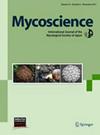从系统发育证据推断出的Caeoma mori (≡ Aecidium mori)的Gymnosporangium mori comb.
IF 1.4
4区 生物学
Q4 MYCOLOGY
引用次数: 0
摘要
在日本茨城县和琦玉县的桑树上发现了 Caeoma mori (≡ Aecidium mori),它被称为桑锈菌,是一种只形成 aecidio uredinia 的拟态锈菌。利用核核糖体 RNA 基因 28S 和 18S 以及线粒体 DNA 的细胞色素-c-氧化酶亚单位 3 的序列组合数据集进行的分子系统学分析表明,这种非形态锈菌是由 Gymnosporangium 属组成的支系的成员。因此,为该物种提出了一个新的组合:Gymnosporangium mori。此外,通过系统发育证据,还为 Roestelia brucensis 提出了一个新的组合,即 G. brucense。本文章由计算机程序翻译,如有差异,请以英文原文为准。
Gymnosporangium mori comb. nov. (Pucciniales) for Caeoma mori (≡ Aecidium mori) inferred from phylogenetic evidence
Caeoma mori (≡ Aecidium mori), known as the mulberry rust which is an anamorphic rust fungus forming only aecidioid uredinia, were found on Morus alba in Ibaraki and Saitama Prefectures, Japan. Molecular phylogenetic analyses using the combined dataset of sequences from 28S and 18S of the nuclear ribosomal RNA gene and Cytochrome-c-oxidase subunit 3 of the mitochondrial DNA revealed that this anamorphic rust fungus was a member of the clade composed of the genus Gymnosporangium. Therefore, a new combination, Gymnosporangium mori is proposed for this species. Additionally, a new combination, G. brucense for Roestelia brucensis is proposed by phylogenetic evidence.
求助全文
通过发布文献求助,成功后即可免费获取论文全文。
去求助
来源期刊

Mycoscience
MYCOLOGY-
CiteScore
3.00
自引率
7.10%
发文量
32
审稿时长
3 months
期刊介绍:
Mycoscience is the official English-language journal of the Mycological Society of Japan and is issued bimonthly. Mycoscience publishes original research articles and reviews on various topics related to fungi including yeasts and other organisms that have traditionally been studied by mycologists. The research areas covered by Mycoscience extend from such purely scientific fields as systematics, evolution, phylogeny, morphology, ecology, physiology, biochemistry, genetics, and molecular biology, to agricultural, medical, and industrial applications. New and improved applications of well-established mycological techniques and methods are also covered.
 求助内容:
求助内容: 应助结果提醒方式:
应助结果提醒方式:


